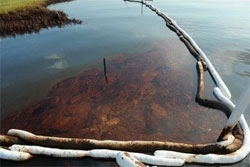Obama reverses oil drill expansion after BP spill
 |
The move, announced by Interior Secretary Ken Salazar, would ban until beyond 2017 oil and gas exploration in areas where there is currently no drilling activity, such as the eastern Gulf of Mexico off the coast of Florida, and the mid- and southern Atlantic Ocean.
Drilling in the Arctic, where only one company, Shell, has applied for a permit to drill a single well, would proceed with "the utmost caution," said Salazar.
But the policy shift does not affect drilling in the central or western Gulf of Mexico, where an explosion on BP's Deepwater Horizon rig on April 20 triggered the worst maritime oil disaster in US history.
"We have revised our initial March announcement... to focus and expand our critical resources on areas with leases that are currently active," said Salazar.
"The modified plan allows currently scheduled lease sales to proceed in the western and central Gulf of Mexico, subject to rigorous environmental analysis."
The decisions brought mixed reactions from lawmakers in states that were affected by the Gulf oil spill or which would have seen oil rigs off their coastlines if exploration had gone ahead in the Atlantic and eastern Gulf.
Florida Democratic Senator Bill Nelson welcomed the decision, saying it would help safeguard his state's tourism and fishing industries.
"I’m glad the White House is listening to the people of Florida, and has decided not to allow any new oil drilling leases in the eastern Gulf.
"As I’ve said, and long before the BP spill, just one accident could ruin Florida’s tourism economy and our unique environment, not to mention the Everglades," Nelson said.
Democrat Edward Markey of Massachusetts, who chairs key energy panels in the House of Representatives, said the policy shift showed "the Obama administration has heeded the lessons of the BP disaster.
"This plan will move America forward on a prudent path until we can ensure that when an oil company drills ultra-deep, it is ultra-safe," he said.
Environmental groups, which had bitterly opposed Obama's decision in March to open up new areas in the Atlantic and eastern Gulf to oil and gas exploration, gave the announcement a mixed reception.
The Natural Resources Defense Council (NRDC) said the move "did not go far enough."
Leaving the door open for exploratory drilling in the Arctic and allowing seismic testing in the Atlantic could put the environment and the livelihoods of millions of Americans at risk, said Peter Lehner, director of the NRDC.
"Healthy oceans are vital to seafood and recreational industries that pump nearly $130 billion into the US economy each year and employ more than two million Americans.
"We can't put those jobs at risk for offshore drilling that the Department of Energy says won't make much difference in our oil and gas supplies for at least another 20 years," Lehner said.
Athan Manuel of the Sierra Club environmental group said that while keeping drilling out of the eastern Gulf and Atlantic was a "significant step in the right direction... an oil spill like the BP disaster could happen anywhere -- in Alaska or in the central and western Gulf where drilling is allowed."
The conservative US Chamber of Commerce, meanwhile, panned the policy shift, calling it a "major step backward for the security of America's energy future.
"By continuing to keep most of America's abundant oil and natural gas resources under lock and key, the Obama administration is ensuring that we will continue to increase our dependence on foreign oil," it said.
"The administration is sending a message to America's oil and gas industry: take your capital, technology and jobs somewhere else."
Republican Congressman John Culberson of Texas also gave the move the thumbs-down, saying it would "raise energy prices, dampen economic growth, send American jobs overseas, and inflict more pain and suffering on American consumers during these difficult economic times."
The tragic April 20 explosion on BP's Deepwater Horizon rig in the Gulf of Mexico killed 11 workers and ended up spewing a record 4.9 million barrels, or 185 million gallons, of toxic crude into the sea.
It crippled local fishing and tourism industries in Louisiana and other Gulf coast states and caused untold damage to the Gulf of Mexico's fragile eco-system.
>> BP failed to learn from past 'near misses': oil spill panel
What the stars mean:
★ Poor ★ ★ Promising ★★★ Good ★★★★ Very good ★★★★★ Exceptional
Related Contents
Latest News
More News
- Russian President congratulates Vietnamese Party leader during phone talks (January 25, 2026 | 09:58)
- Worldwide congratulations underscore confidence in Vietnam’s 14th Party Congress (January 23, 2026 | 09:02)
- Political parties, organisations, int’l friends send congratulations to 14th National Party Congress (January 22, 2026 | 09:33)
- 14th National Party Congress: Japanese media highlight Vietnam’s growth targets (January 21, 2026 | 09:46)
- 14th National Party Congress: Driving force for Vietnam to continue renewal, innovation, breakthroughs (January 21, 2026 | 09:42)
- Vietnam remains spiritual support for progressive forces: Colombian party leader (January 21, 2026 | 08:00)
- Int'l media provides large coverage of 14th National Party Congress's first working day (January 20, 2026 | 09:09)
- Vietnamese firms win top honours at ASEAN Digital Awards (January 16, 2026 | 16:45)
- ASEAN Digital Ministers' Meeting opens in Hanoi (January 15, 2026 | 15:33)
- ASEAN economies move up the global chip value chain (December 09, 2025 | 13:32)

 Tag:
Tag:



















 Mobile Version
Mobile Version